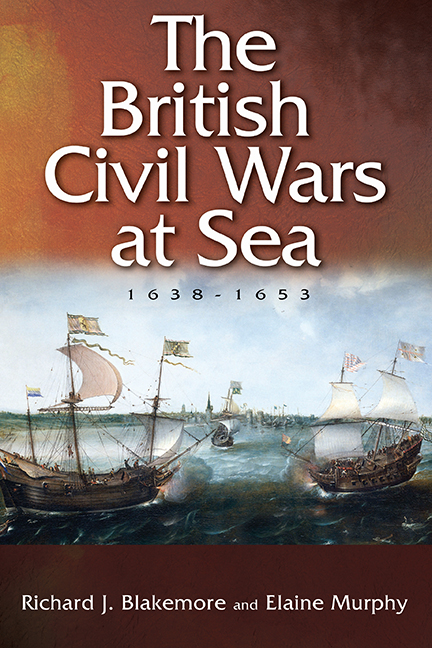Book contents
- Frontmatter
- Dedication
- Contents
- List of Illustrations
- Preface and Acknowledgements
- List of Abbreviations
- Map
- Introduction
- 1 Warfare at Sea in the Early Modern Period
- 2 The Outbreak of War, 1638–1642
- 3 The War at Sea, 1642–1646
- 4 Parliament's Navy, 1642–1646
- 5 Royalist, Confederate, and Scottish Naval Efforts, 1642–1653
- 6 Revolution, 1647–1649
- 7 Conquest, 1649–1653
- Conclusion
- Appendix 1 Timeline of the Civil Wars at Sea, 1638–1653
- Appendix 2 Parliamentarian Fleets, 1642–1649
- Bibliography
- General Index
- Index of Ships
1 - Warfare at Sea in the Early Modern Period
Published online by Cambridge University Press: 19 July 2019
- Frontmatter
- Dedication
- Contents
- List of Illustrations
- Preface and Acknowledgements
- List of Abbreviations
- Map
- Introduction
- 1 Warfare at Sea in the Early Modern Period
- 2 The Outbreak of War, 1638–1642
- 3 The War at Sea, 1642–1646
- 4 Parliament's Navy, 1642–1646
- 5 Royalist, Confederate, and Scottish Naval Efforts, 1642–1653
- 6 Revolution, 1647–1649
- 7 Conquest, 1649–1653
- Conclusion
- Appendix 1 Timeline of the Civil Wars at Sea, 1638–1653
- Appendix 2 Parliamentarian Fleets, 1642–1649
- Bibliography
- General Index
- Index of Ships
Summary
When the civil wars broke out in Britain, the realities of early modern war came as a shock to most of the population. It is true that the British military establishments were not entirely moribund, as historians once thought. Many Scottish, Irish, English, and Welsh soldiers served in continental armies throughout the early seventeenth century, and in the late 1630s and early 1640s returned to the Stuart kingdoms to lend their experience to the armies on all sides. Nevertheless, the majority of people living in the British Isles and Ireland had not seen warfare at first hand before it tore those islands apart.
Seafarers are an exception. The early modern sea was a dangerous place, and not just because of the natural perils that were proverbial. Seafaring was also a distinctly violent undertaking. Contemporary English ballads celebrated seamen's bravery not just because they faced storm and shipwreck, but because they could expect (and often experienced) attack by hostile ships, or indeed participated in such attacks themselves. Conflict was an ordinary and regular feature of maritime commerce, and often the two occurred concurrently: as N. A. M. Rodger has written, ‘Robbery under arms was a normal aspect of seaborne trade’ during medieval times, and in the early modern period too ‘there were few non-combatants at sea’. The maritime side of the British civil wars, therefore, has to be understood within this broader context of European seaborne warfare – warfare which, throughout the sixteenth and early seventeenth centuries, underwent substantial and far-reaching changes. This chapter will introduce that context, looking first at the question of privateering and piracy, then the technological changes which occurred during this period and the contemporary debates over maritime sovereignty, before examining the growth in state navies which resulted from these interrelated factors.
Privateers and pirates
The most important point to begin with is that maritime warfare was not only, or even primarily, carried out by state-owned navies during the early modern period. Indeed, Louis Sicking has argued that in any analysis of sea-power before 1650 a study of ‘naval force’ by itself is insufficient; drawing upon the Dutch term scheepsmacht, Sicking proposes instead the idea of ‘maritime potential’, representing the combination of naval and commercial shipping upon which a state could call.
- Type
- Chapter
- Information
- The British Civil Wars at Sea, 1638–1653 , pp. 12 - 34Publisher: Boydell & BrewerPrint publication year: 2018



